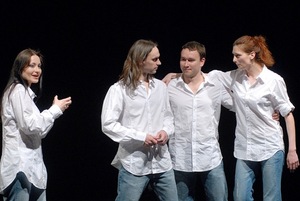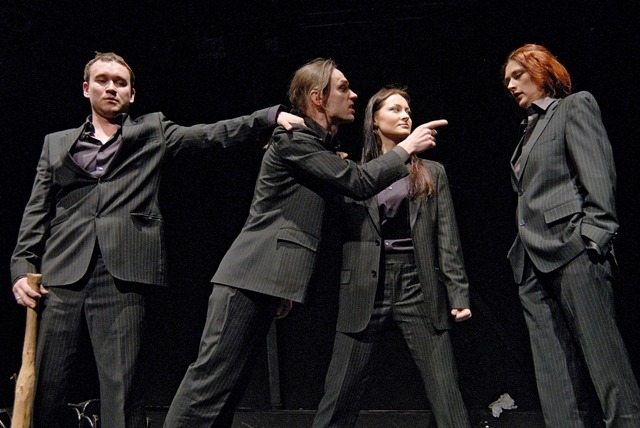ABOUT THEATRE AS POLITICS, ABOUT POLITICS AS GAME 0
(Performance of Caesar’s group “Day of Lithuania”. Production of Audronis Liuga. Author of texts and director Cezaris Graužinis. Actors: Brigita Arsobaitė, Vilma Raubaitė, Paulius Čižinauskas, Julius Žalakevičius) Margarita Pilkaitė
www.kamane.lt, 2007 04 17
"Day of Lithuania”. Photo by D.Matvejevas
In brief: The theatre is the most public from all arts; therefore, the audience is a necessary condition for its existence. Political theatre as a phenomenon is even more public as it deepens into social, political, economical problems refusing purely aesthetical artistic searches.
At the beginning of the 20th century the first creators of the political theatre Erwin Piscator or Bertold Brecht refused the theatrical illusion, creation of personages, exploitation of themes about eternal values, traditional scenography and dramaturgy. At the beginning of the 21st century Caesar’s group created a new version of the political theatre – “Day of Lithuania” of two parts. The performance balances between the principles of the political and playful theatre aesthetics.
In the first part actors as real politicians are solving the issues of the Lithuanian identity and formation of the country's image. In the second part they are acting suicides who met after death and who receive the last chance to return and spend a day on Earth. The performance is created in a playful manner by improvising and forming the illusion of a coincidence. Thus, the performance distances from the traditional political theatre. The mirror of life represented by the political theatre is a curved one in the performance of Caesar’s group. It is curved in a funny manner.
Four “politicians” are arguing enthusiastically about the creation of Lithuania’s image in Europe and methods who to attract EU funds. Prototypes of these characters could be found in the reality – an egocentric authority is acted by Paulius Čižinauskas, a strict and serious woman – by Brigita Arsobaitė, a rather aggressive type – by Julius Žalakevičius and a silent Lithuanian person who believes in the bright future of the state is acted by Vilma Raubaitė.
There are fewer elements of the political theatre in the second part of the performance - the problems remain actual but the actors do not avoid direct contact with the audience, they distance from their created characters. While the first part of the performance was full of irony turning into vitriol, the second act is very light, it represents the good and innocent look to the world.
The work of Caesar’s group is not the first attempt to create the political theatre. The performance of Gintaras Varnas and his students “Hail of Stars” staged at Kaunas Drama Theatre also was not based on any dramaturgy and analysed the actual public phenomenon – reality shows. Even though both performances differ by the analysed problems and artistic expression, their purpose is to analyse urgent problems, to show one's relation with them, to affect the audience directly creating the action via thinking and discussion rather than via emotion.
Therefore, the theatre is stepping down from self-centred artist pedestal and comes to the audience. It shows that it cares about the audience and the country where people and actors live. Theatre turns into politics in the wide meaning and in a playful manner.


